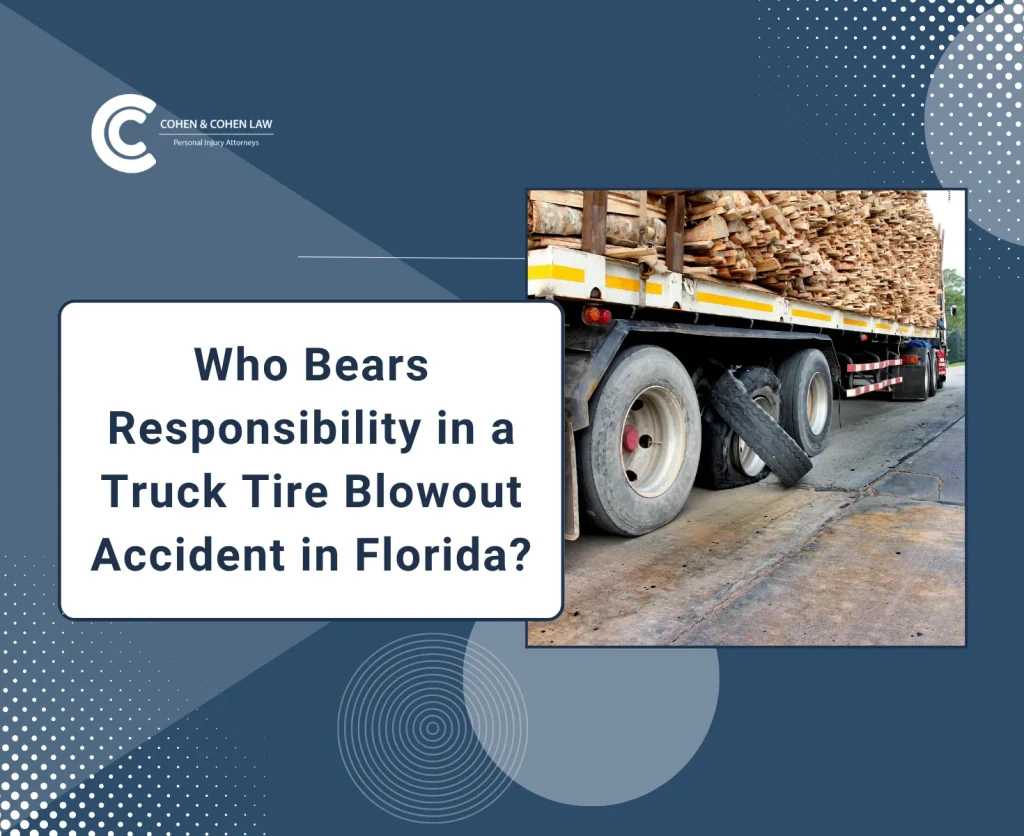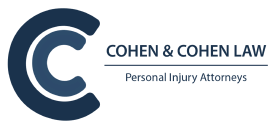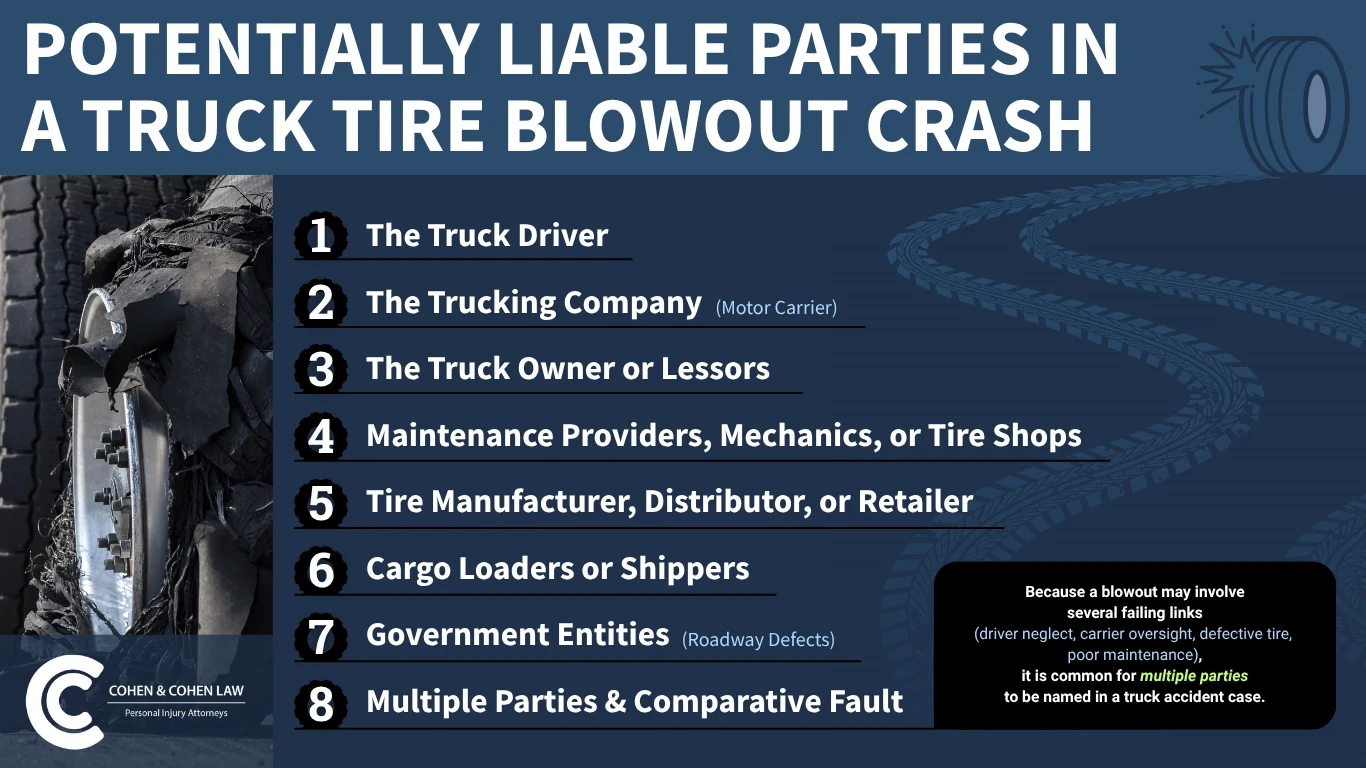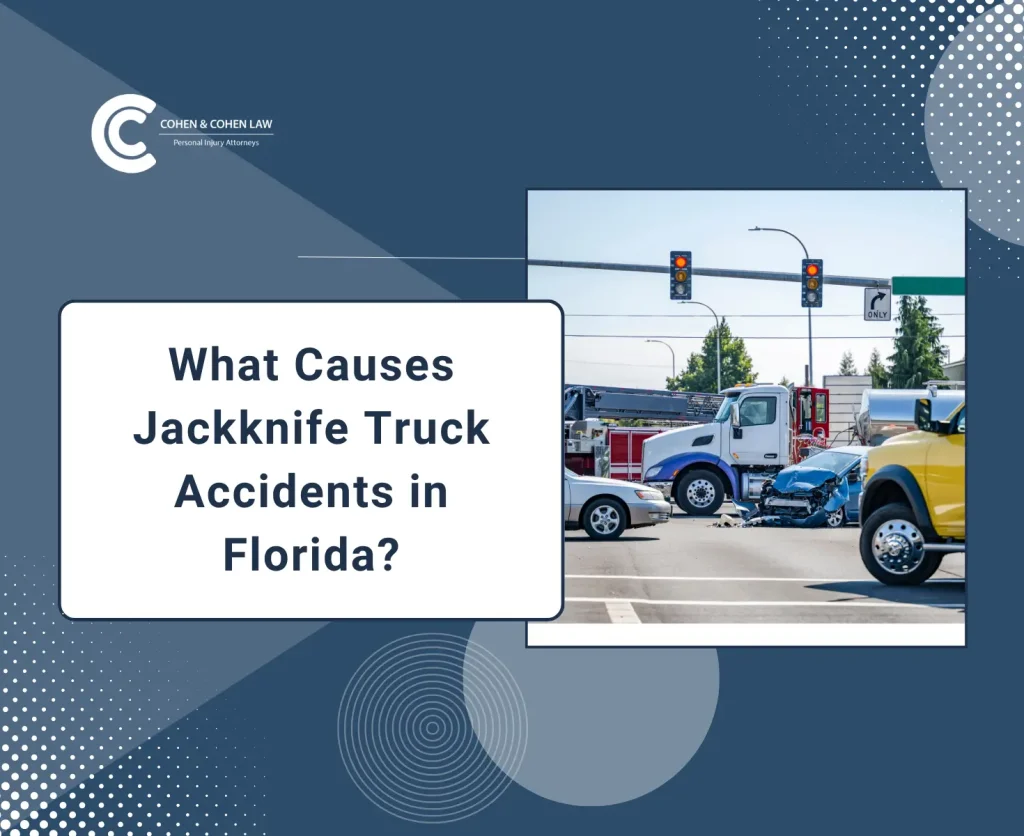Who Bears Responsibility in a Truck Tire Blowout Accident in Florida?
October 15, 2025 – Adam Mann

If you or a loved one have just been involved in a truck tire blowout accident in Florida, the pain and uncertainty can be overwhelming. You’re facing mounting medical bills, possibly lost wages, emotional trauma, and the shadow of dealing with large insurance companies and trucking corporations. You may be asking: “Who is to blame? Who is responsible for my injuries? Can I hold someone accountable for what happened?” These questions are urgent — and the answers depend on a careful legal analysis of fault, duty, and evidence specific to Florida law.
Below, we will explore, in detail, how liability is assigned in a truck tire blowout accident in Florida, what legal theories injured parties can pursue, and how our firm at Cohen and Cohen Law approaches these complex cases. Schedule an initial consultation by calling (800)-33COHEN(800)-33COHEN or completing the online form to discuss your legal options at no cost to you.
Understanding the Nature of a Truck Tire Blowout and Its Risks
Before diving into liability, it helps to understand what a tire blowout is in the context of a large truck accident and why such failures often lead to catastrophic consequences.
What is a “Tire Blowout” in a Commercial Truck?
A tire blowout is a sudden and catastrophic failure of a tire—typically in which the tire’s structure (sidewall, bead, belt, tread, or bonding) gives way under stress, causing rapid loss of air pressure. In a large truck, the sudden rupture of a tire can destabilize the entire vehicle, causing loss of control, rollover, jackknife, or causing the truck to veer into other traffic.
Because trucks are so heavy and operate under high load conditions, a blowout on a tractor-trailer or other large commercial truck often leads to far more severe damage and injury than in a typical car accident. Smaller vehicles in the vicinity can be crushed, forced off lanes, or caught in a chain-reaction crash.
Common Causes of Tire Blowouts in Trucks
Not every tire blowout is the result of a defect or negligence. The contributing factors may include:
- Underinflated or overinflated tires, which raise heat buildup and internal stress
- Worn or mismatched tires (tires of different sizes/ratings used together)
- Improper installation or defective maintenance (e.g. misaligned wheels, torque errors)
- Excessive load or overloading beyond the tire’s rated capacity
- Road hazards such as potholes, debris, nails, or sharp objects
- Manufacturing defects, design flaws, or failure to warn
- Delayed replacement, aging or fatigued tires
- Heat stress and tire overheating under heavy use
- Poor wheel or rim integrity, or problems with the truck’s suspension, axles, or lug nuts
Because so many variables can contribute, determining legal liability in a crash involving a truck tire blowout requires a careful investigation and expert analysis.
Legal Framework in Florida: Negligence, Comparative Fault & Product Liability
In Florida, injured truck accident victims can pursue claims based on negligence, strict liability (in product defect cases), or other legal theories depending on the facts. Below is how Florida’s legal landscape affects a blowout case.
The Duty and Breach Framework of Negligence
A basic negligence claim requires:
- a duty owed by a party
- a breach of that duty
- causation (both actual and proximate)
- damages
In the case of a truck accident, those duties may be imposed on the truck driver, the trucking company, maintenance contractors, or others.
For example:
- A truck driver owes a duty to operate and maintain the vehicle with reasonable care (which includes checking tire inflation, inspecting tires, rotating, replacing when necessary).
- A trucking company (the motor carrier) owes a duty under Florida law and under the Federal Motor Carrier Safety Regulations (FMCSRs) to maintain its fleet, inspect trucks, supervise drivers, and ensure safe operation.
- A maintenance provider or mechanic may have a duty to install, inspect, or repair tires safely.
- A tire manufacturer or distributor may have a duty under product liability or negligence to produce tires free of defects or to warn of known dangers.
When a party fails in its duty — for example by failing to properly maintain the truck or by installing a faulty tire — that failure may serve as the breach.
Modified Comparative Fault in Florida
Florida follows a modified comparative negligence regime. Under this rule, an injured party can recover damages so long as they are not more than 50% at fault for their own injuries. If they bear 51% or more fault, they are barred from recovery. If their share of fault is less than or equal to 50%, the compensation they could be eligible to collect would be reduced by their percentage of fault. (For example, if your damages are $100,000 and you are 20% at fault, the potential compensation would be reduced to $80,000.)
Even if multiple parties share responsibility — including the injured party — the percentage of fault becomes central to a truck tire blowout accident claim.
Product Liability and Strict Liability for Defective Tires
For crashes caused by defective tires, injured parties often assert a product liability claim, under a theory of strict liability, negligence, or breach of warranty. In Florida, a plaintiff does not always need to prove negligence of the manufacturer if strict liability applies. The focus is on:
- Whether the tire was defective when it left the manufacturer or distributor
- Whether the defect caused the blowout and resulting harm
- The nature of the defect (manufacturing defect, design defect, or inadequate warning)
Florida law generally gives a two-year statute of limitations from the time the injury is discovered for product liability claims, and a two-year limit when wrongful death is involved.
In a truck tire blowout accident, you may see a hybrid legal strategy combining negligence claims (against driver, carrier, maintenance provider) and product liability claims (against the tire maker/distributor).
Potentially Liable Parties in a Truck Tire Blowout Crash
In a crash caused by a truck tire blowout, liability often does not rest on a single entity. Below are the types of parties that may share responsibility, depending on the facts.
1. The Truck Driver
The driver is often the first party investigated for liability. In a blowout scenario, possible driver-related failures include:
- Failing to inspect tires or perform required checks
- Operating the truck with underinflated or worn tires
- Driving at speeds that increase stress on tires
- Carrying an overloaded load
- Ignoring warning signs, vibrations, or unusual tire behavior
- Failing to react safely after the blowout (losing control, making unsafe maneuvers)
If the driver’s negligence in maintenance or operation contributed to the blowout or subsequent crash, that individual may be held liable.
2. The Trucking Company (Motor Carrier)
Often the most heavily targeted defendant, the trucking company may bear liability because of its control over maintenance, operations, scheduling, and emphasis of safety in the company culture. Areas in which a trucking company may fail include:
- Neglecting fleet inspection programs or routine truck maintenance
- Skipping required inspections, such as following FMCSR’s regulations
- Hiring unsafe or underqualified drivers
- Imposing unrealistic delivery schedules that encourage shortcuts or overuse
- Failing to supervise drivers’ adherence to safety procedures
- Delegating maintenance to independent contractors without oversight
A court may hold the trucking company responsible under theories of vicarious liability (respondeat superior) for driver misconduct, or under direct negligence if it failed in its corporate duties.
Note: Florida appellate decisions have declined to impose blanket liability on carriers for third-party repairs when carriers can show they engaged in reasonable inspections.
3. The Truck Owner or Lessors
If the truck is leased, owned under a different entity, or under a separate ownership structure, the truck owner may be liable if it had maintenance responsibilities or failed its own inspection duties.
4. Maintenance Providers, Mechanics, or Tire Shops
If an independent repair shop or mechanic improperly installed, repaired, or inspected tires (for example, failing to torque lug nuts, mismatching tires, or using defective components), they may be liable under negligence. If the blowout occurred due to a mechanical defect that should have been detected, the maintenance provider may share responsibility.
5. Tire Manufacturer, Distributor, or Retailer
When a defective tire is at fault, liability may be imposed on one or more nodes in the tire’s chain: the manufacturer, distributor, or retailer under product liability or negligence theories. Potentially actionable scenarios may include:
- A manufacturing defect that caused the tire to fail unexpectedly
- A design defect that made the tire unreasonably dangerous
- The manufacturer failed to issue proper warnings or instructions
- The distributor or retailer negligently stored or handled the tire, degrading its integrity
Because product liability claims allow for strict liability, injured parties may be able to succeed in their claim without proving the tire maker’s negligence — provided that defect, causation, and damages can be shown.
6. Cargo Loaders or Shippers
If improper loading created weight imbalances or stress that contributed to the tire failure, an entity responsible for loading or securing cargo may be partly liable. For example, if the trailer was overloaded or weight was unevenly distributed, the radial stress on tires may increase risk of failure.
7. Government Entities (Roadway Defects)
In rare cases, a blowout may occur due to road defects, hazards, potholes, or debris improperly maintained by municipal or state agencies. If those hazards contributed to the accident, a government or public authority may share responsibility (subject to sovereign immunity limitations).
8. Multiple Parties & Comparative Fault
Because a blowout may involve several failing links (driver neglect, carrier oversight, defective tire, poor maintenance), it is common for multiple parties to be named in a truck accident case. The legal process often requires apportioning fault across these parties—and possibly assigning some share of fault to the injured party.
How Liability Is Proven: Investigation, Evidence & Expert Witnesses
In a truck tire blowout claim, successful recovery hinges on the depth and quality of the investigation. Below are the major steps and evidence categories your legal team will pursue.
1. Immediate Steps at the Accident Scene
While at the accident scene:
- Document (photograph/video) the accident scene, including skid marks, debris, damaged tires, and vehicle positions
- Preserve the blown tire(s), rims, and other damaged components
- Record DOT numbers, serial numbers, and label codes on the tires (these help trace manufacturing history)
- Get contact information from witnesses and other motorists
- Request and secure the police report
- Refrain from making statements or signing documents from insurance companies
2. Collect Key Documents and Records
Be sure to work with your attorney to collect the following valuable evidence in your truck accident case:
- Truck maintenance logs, inspection records, and service history
- Driver logs, trip sheets, and ELD data
- Tire purchase and replacement invoices
- Records from maintenance facilities or contractors
- The truck’s black box / ECM data (if available)
- Insurance policies and coverage declarations
- Cargo manifests / loading records
- Repair shop records and inspection reports
3. Engage Expert Witnesses
Various types of experts and specialists can serve as witnesses to support your claim:
- Accident reconstructionists to model the blowout dynamics, trajectories, and control loss
- Tire failure experts to analyze metallurgy, bonding, fatigue, and defect origin
- Mechanical engineers to evaluate installation, alignment, and component stress
- Industry experts to compare practices against FMCSR requirements
These experts can help establish causation, showing that the blowout was foreseeable, preventable, and primarily attributable to a defective component or negligent maintenance rather than an unforeseeable road hazard.
4. Causation and Intervening Forces
One of the defendant’s likely defenses is that the blowout was triggered by unforeseeable external forces—e.g., sudden debris, potholes, or acts of others. To counter that, your legal team must show that:
- The tire defect or maintenance failure was a substantial factor, not a remote cause
- The blowout would have been avoided under proper care
- The driver and carrier should have anticipated the risk, given the conditions
5. Apportioning Fault and Comparative Negligence
Because Florida’s modified comparative negligence allows a reduction in recoverable damages based on your share of fault (up to 50%), the legal process will often focus on the defense’s attempts to shift blame onto the injured party or third parties. Your legal team must present clear evidence to limit your share of fault.
6. Valuation of Damages
Once liability is established, the legal team assesses all forms of damages:
- Past, present, and future medical bills
- Hospital bills and rehabilitation costs
- Loss of income / lost wages and diminished earning capacity
- Property damage to your vehicle and other harmed property
- Non-economic damages like pain, suffering, emotional distress, and loss of normal life
- In rare cases, punitive damages (if gross negligence by a party is proven)
An experienced truck accident attorney will build a robust damages model, accounting for inflation, life expectancy, nursing care, and more.
Key Legal Challenges in Truck Tire Blowout Cases & How to Overcome Them
A truck tire blowout accident presents more hurdles than a typical car crash. Here are common challenges and how Cohen and Cohen Law approaches them:
Multiple Parties and Blame Shifting
Because liability may lie with the driver, carrier, maintenance shop, tire manufacturer, cargo loader, or others, defendants commonly shift blame among each other. The injury victim and their attorneys must cast as wide a net as feasible, identifying each of the possible negligent actors and assessing their part in the accident. Missing or misnaming a party can jeopardize your ability to recover appropriate compensation.
Changing or Destroying Evidence
Tires, rims, or maintenance records are sometimes discarded, altered, or lost, especially in a crash involving a large commercial vehicle. Prompt action is essential to issue preservation letters, secure the components, and issue subpoenas. Delays can severely weaken your case.
Demonstrating the Defect or Negligence
Defendants will often assert that the blowout was caused by an unforeseeable road hazard or by your own fault. To rebut that, you must build a strong causation narrative with expert testimony. Your legal team must show that the blowout was avoidable under proper maintenance or that a defect made it inevitable.
Handling the Insurance Companies
Truck accident claims often involve multiple liability insurance carriers, umbrella policies, and complex coverage issues. Insurance adjusters will aggressively try to minimize settlement offers or argue contributory fault. A skilled legal team must manage these demands, resist early lowball offers, and force insurers to provide full policy disclosures.
Statutes of Limitations and Timeliness
Missing the relevant statute of limitations destroys an accident victim’s claim. For negligence claims and most tort claims, Florida gives you two years to file a lawsuit from the date of the accident or discovery of injury. For wrongful death, the window is also two years.
Deadlines in trucking law and federal regulations may require early notice or protective filings. Your truck accident attorney can guide you through the process and handle steps to file in a timely manner.
Apportioning Fault to the Injured Party
Defendants will often argue that you share fault (for instance, by failing to anticipate sudden debris or making control errors after the blowout). Because Florida’s modified comparative negligence reduces awards by your share of fault, your legal team must carefully analyze and counter each of these assertions.
Steps You Should Take To Protect Your Rights After a Truck Tire Blowout Crash
From the early moments after an accident, your actions matter greatly. Taking the following steps can help to preserve your legal position:
- Seek immediate medical attention, even if injuries appear mild. Early diagnosis is often central to building a strong claim accounting for the scope of a victim’s injuries and losses.
- Avoid giving recorded statements or signing releases with the trucking company or insurers.
- Document the scene thoroughly — photos of vehicles, tires, road conditions, debris, skid marks.
- Preserve evidence — retain the truck, tire, and components. Do not permit them to be destroyed.
- Collect witness information and statements.
- Secure the police report and file your own report if required.
- Notify your personal insurance and cooperate with PIP (Personal Injury Protection) coverage.
- Contact a Florida truck accident lawyer who understands tire-failure litigation.
- Let your attorney issue preservation letters to all parties (truck company, repair shop, insurer).
- Compile records — medical records, bills, wage proof, repair estimates, maintenance logs, driver logs.
Prompt action aligns your claim with the legal process and strengthens your case for compensation.
Why Working with a Florida Personal Injury Law Attorney Matters in Tire Blowout Cases
A case involving a truck tire blowout often demands far more sophistication than a standard car accident case. Here’s how a personal injury law attorney experienced in truck accident claims helps throughout a case:
- We identify each of the potentially liable parties (carrier, driver, maintenance shops, tire manufacturers, loaders).
- We coordinate forensic experts, tire analysts, mechanical engineers, and accident reconstruction professionals.
- We manage complex insurance issues and interpret multiple policies.
- We fight for full acute and long-term medical bills, lost wages, pain and suffering, and non-economic losses.
- We analyze comparative fault arguments and counter them.
- We handle all legal strategy, filings, pretrial motions, and negotiations, allowing you to focus on recovery.
- We work on a contingency fee basis, meaning you do not pay unless compensation is recovered.
If you are searching for “truck accident attorneys near me” in South Florida, our team is positioned to deliver skilled, responsive representation. A trusted Florida truck accident lawyer will elevate your ability to pursue a fair resolution.
What to Expect from the Legal Process in a Truck Tire Blowout Case
Understanding the procedural journey helps ease anxiety. Here is an outline of the process to pursue a truck tire blowout case in South Florida:
- Initial consultation — a free evaluation of your facts and rights.
- Case opening and investigation — sending preservation letters, collecting evidence, interviewing witnesses, hiring experts.
- Demand package — presenting a settlement demand with documentation of liability and damages.
- Negotiations with insurers — engaging the trucking company and insurers in settlement talks.
- Filing suit — if negotiations fail, a civil complaint is filed before the statute of limitations.
- Discovery phase — written interrogatories, requests for documents, depositions of parties and expert witnesses.
- Motions and hearings — defense may file motions to dismiss or summary judgment; your team counters.
- Mediation / settlement conference — attempting resolution before trial.
- Trial — presenting evidence to a judge or jury, cross-examination, expert testimony, closing arguments.
- Post-judgment collection — enforcement of the judgment or structured payout.
Because of the complexity and stakes, many truck accident claims settle pre-trial. However, our truck accident attorneys at Cohen and Cohen Law are prepared to try the case if needed.
Who Can Be Liable for Tire Blowouts & Why It Matters in Florida
In a truck tire blowout accident, liability may fall on multiple parties based on their role in vehicle maintenance, design, operations, and oversight. Assigning fault requires proving:
- The existence of a duty
- A breach of that duty
- That the breach caused the blowout and crash
- That you, as the injured party, suffered damages
Florida’s modified comparative negligence rule means your share of fault (if any) will reduce what you can recover. Meanwhile, product liability principles may allow you to hold tire manufacturers accountable under strict liability. Because of the breadth of potentially liable actors — truck driver, trucking company, mechanic, tire maker, cargo loader, or others — a thorough investigation and expert contributions are indispensable.
If you or a loved one is facing mounting medical bills, lost wages, pain, and uncertainty after a blowout crash, an experienced truck accident attorney can walk you through the process, protect your rights, and pursue full compensation. Many injury lawyers, including those at Cohen and Cohen Law, take these cases on a contingency fee basis (you pay only if there is a recovery), so risk is minimized for you.
Next Steps & How Cohen and Cohen Law Can Help You
If you or a family member have been injured in a truck tire blowout accident in South Florida, you do not need to face this alone. Let us take the burden from your shoulders—while you focus on recovering, we’ll handle the legal fight.
Schedule an initial consultation by calling (800)-33COHEN(800)-33COHEN or completing the online form to discuss your legal options at no cost to you. During this free legal consultation, we will listen to the details of your accident involving a truck and develop an approach to pursuing compensation for lost wages, medical bills, and all damages pertaining to your unique case. With transparent communication, extensive knowledge, and genuine empathy, we have been helping personal injury victims in South Florida for over 55 years.
Copyright © 2025. Cohen and Cohen Law. All rights reserved.
The information in this blog post (“post”) is provided for general informational purposes only and may not reflect the current law in your jurisdiction. No information in this post should be construed as legal advice from the individual author or the law firm, nor is it intended to be a substitute for legal counsel on any subject matter. No reader of this post should act or refrain from acting based on any information included in or accessible through this post without seeking the appropriate legal or other professional advice on the particular facts and circumstances at issue from a lawyer licensed in the recipient’s state, country, or other appropriate licensing jurisdiction.
Cohen and Cohen Law
4000 Hollywood Blvd penthouse 705s
Hollywood, FL 33021
(800)-33COHEN(800)-33COHEN
https://www.cohenandcohenlaw.com
Take Action Now – Speak to Your Attorney &
Seek the Settlement You Need
Contact Us Today For a Free Case Consultation
Required Fields*
Your Information Is Safe With Us
We respect your privacy. The information you provide will be used to answer your question or to schedule an appointment if requested.






